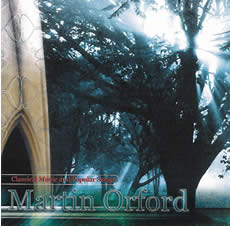
Image © Giant Electric Pea 2003
|
|
(30 November 2003). A tremendous collection of sounds is available to progressive rock enthusiasts on Martin Orford's Classical Music and Popular Songs (GEP (UK) CD1026, 2000). Our editors were introduced to the album by Terry Sullivan, drummer for Renaissance during the 1970s through their album Azure d'Or. The album features a ten tracks certain to appeal to a broad audience and delight Asia, IQ and other symphonic rock band enthusiasts. Since receipt of the album, it has been in heavy rotation at Musical Discoveries' headquarters. In addition to Martin Orford who features on keyboards, piano, flute, mandolin and vocals, the album includes contributions from a vast array of artists including Gary Chandler (electric guitar), Steve Christey (drums), John Jowitt (bass), David Kilminster (acoustic guitar), Steve Christey (drums), Paul Cook (tambourine, John Wetton (lead and backing vocals), Tony Wright (sax), Michael Holmes (lead guitars), Paul Cook (drums) and Peter Nicholls (lead vocal). Classical Music and Popular Songs has a timeless quality to its sound. That the production quality of the album is absolutely second to none only adds to its appeal. All vocal work on the album is male, and while that might put a review of it out of place at Musical Discoveries, the album is so strong that it deserves our (and you all as our readers) attention. About "The Field Of Fallen Angels" that opens the album, Orford writes, "An uptempo song in a progressive rock vein, but with some obvious influences from British folk music. I thought it would be interesting to use traditional instrumentnts such as mandolin and bagpipes to suppliment the usual rock band instrumentation." It is a great track. Orford plays acoustic guitar, very Steve Howe style, in "The Picnic." "A Part Of Me" is most reminscent for us of the grand stadium sound of Asia, perhaps owing to the incredible vocal work of John Wetton and Gary Chandler's melodic guitar parts. "The Days Of Our Lives" also has a big Asia influence. A gentle and simple ballad, it is a great song. The sax solo in the bridge adds a great texture. The upbeat and rocking tune "The Final Solution" and the tremendous power of "The Overload" both appear to have a strong IQ influence. One of the album's standouts is certainly the powerful 1970s style rock instrumental "Fusion." Martin Orford writes, "A very old instrumental with a Baroque influence, written while I was at school, some 25 years ago." He continues, "If it sounds like an archetyal 1970s progressive rock, it's because that's exactly what it is." It is a stunning number, one that listeners will play over and over. The album features some great symphonic progressive material with stong classical influences. Such is the case with the stunning solo piano number "Quilmes." This sound further develops with the rich orchestration of the tremendous and classically influenced masterpiece and standout track "Tatras." The album concludes with the final number, "a serene and peaceful instrumental inspired by the timeless atmosphere of rural Hampshire, where I live," writes Orford. Led by keyboards, the rich arrangements are a testament to the artist's virtuosity. The melody of the song fills the listener with hope and as the full band joins, we are reminded of the progressive roots of the artists involved. Read further reviews, listen to soundbites and order the album from amazon.comhere.  Martin Orford's Classical Music and Popular Songs is an album of tremendous depth and excellent production quality. Martin Orford's Classical Music and Popular Songs is an album of tremendous depth and excellent production quality.
|






